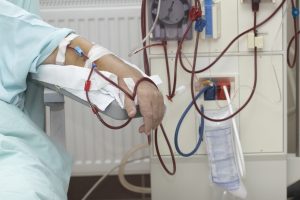
Acute kidney injury is most commonly seen among people who have been hospitalized, particularly in those who need intensive care.
Acute kidney injury: Causes, risk factors, and complications
Acute kidney injury can result from various conditions that reduce blood flow to the kidneys, as well as infections, pregnancy, and other disorders affecting the kidneys. Causes of acute kidney injury include:
- acute tubular necrosis (ATN)
- severe or sudden dehydration
- toxic kidney injury from poisons or certain medications
- autoimmune kidney diseases, such as acute nephritic syndrome and interstitial nephritis
- urinary tract obstruction
- low blood pressure
- burns
- dehydration
- hemorrhage
- injury
- septic shock
- serious illness
- surgery
- hemolytic uremic syndrome
- idiopathic thrombocytopenic thrombotic purpura (ITTP)
- malignant hypertension
- transfusion reaction
- scleroderma
Risk factors for acute kidney injury include having kidney disease, liver disease, diabetes, high blood pressure, heart failure, and being moderately obese.
If acute kidney injury is left untreated, complications can arise including chronic kidney failure, heart damage, end-stage renal failure, nervous system damage, muscle weakness, chest pain, fluid buildup, high blood pressure, and even death.
Symptoms of acute kidney injury
In some cases, acute kidney injury will not present any symptoms and isn’t detected unless undergoing lab tests.
Diagnosing acute kidney injury
If you do present signs and symptoms of acute kidney injury, your doctor will need to run tests in order to properly diagnose the condition. Diagnostic tests for acute kidney injury include urine output measurements, urine tests, blood tests, imaging tests like ultrasound or CT scan, and a biopsy.
These tests help determine if your kidneys are functioning properly and reveal any abnormalities that would suggest acute kidney injury.
Acute kidney injury treatment options
In order to properly treat acute kidney injury, you will be referred to a kidney specialist – nephrologist – who will evaluate your condition and make recommendations for your treatment.
Diet changes are also necessary to treat AKI. A diet high in carbohydrates and low in protein, salt, and potassium is usually recommended.
You may also be advised to go on antibiotics to fight off any infection along with diuretics to remove fluid.
If kidney damage is severe or waste buildup is in excess, you may be recommended for dialysis to help filter out your blood.
Acute kidney injury prevention
Acute kidney injury is difficult to predict and prevent, so you should generally take the necessary steps to keep your kidneys healthy. This includes being mindful of over-the-counter medications you are taking such as following the instructions and not taking more than needed, working closely with your doctor to manage any existing kidney problems, and living a healthy lifestyle as much as possible (eating well, exercising regularly, not smoking, minimizing your alcohol intake, and managing your weight).
Sources:
https://www.kidney.org/atoz/content/AcuteKidneyInjury
http://www.mayoclinic.org/diseases-conditions/kidney-failure/basics/definition/con-20024029
http://www.healthline.com/health/acute-kidney-failure#Treatment6
http://www.mayoclinic.org/diseases-conditions/kidney-failure/basics/complications/con-20024029
http://www.mayoclinic.org/diseases-conditions/kidney-failure/basics/symptoms/con-20024029
http://www.mayoclinic.org/diseases-conditions/kidney-failure/basics/tests-diagnosis/con-20024029
ttp://www.mayoclinic.org/diseases-conditions/kidney-failure/basics/prevention/con-20024029